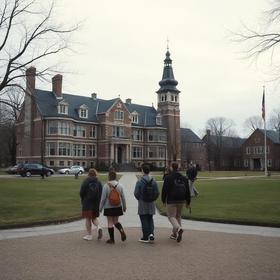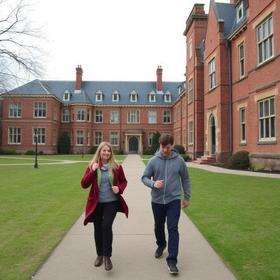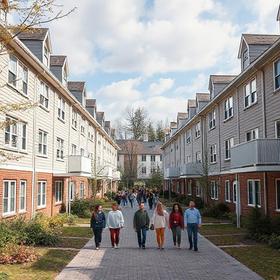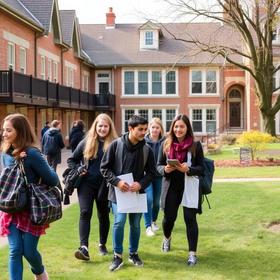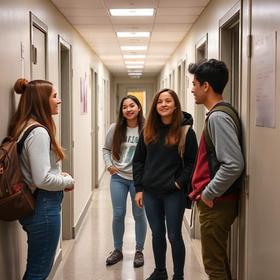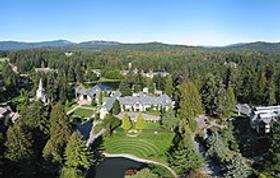As you work through choosing the right boarding school for your child, you will find it easy to get side-tracked. Nothing wrong with getting side-tracked. Just make sure that you get yourself back on track. There are three to five schools for you to visit. Lots of observations, evaluations, assessments, and questions. Make sure that you have checked all the boxes.
1. Location
The location of the boarding schools on your list is essential simply because travel these days is never easy. Review the logistics involved carefully. Ideally, you don't want to be more than a few hours from the school. That may seem unrealistic, but practically speaking, it is not. For example, there are dozens of schools within an hour of Boston's Logan Airport. From there, you can get to many major metropolitan areas in two hours. Incidentally, those New England boarding schools are old hands at transferring students from campus to the airport. Those are precision operations honed over many years so that just about every travel eventuality is thought of. Naturally, cell phones make communications with you waiting anxiously on the other end much more accessible than when my daughters went to boarding school. So draw a circle 60-120 miles out from any major airport. If boarding schools fall within the circle, you should be all set.
2. Academics
Once you have more or less decided where you are looking for schools, then you can begin to get granular with that very important item on your checklist: academics. Like the boarding schools you have been looking at, each school's academic program is unique. No state or federal government tells a private school what or how to teach it. Yes, there are state-mandated minimums in core subjects. But the reality is that 99.9% of private schools meet or exceed those minimums. Why is that? Because you and I, their clients, demand a rigorous academic component in our children's education. That, after all, is one of the things we are paying for. In most cases, it is our main reason for sending our children to private schools.
This brief video illustrates the Harkness Method of teaching.
The major decision you have to make here is whether you want to stay with a traditional approach to academics or go for the progressive approach. Traditional means a full-fledged college preparatory academic curriculum replete with Advanced Placement courses and SAT/ACT preparation. If that sounds like you are boxing your child in somehow or that it smacks of teaching to the test, in some respects, that's true. The difference is that boarding school teachers don't just teach the required material. They will do that very well and very efficiently. However, because their class sizes are small and all their students are there to learn, boarding school teachers can take most of the subject matter to the next level and, in some cases, the level above that. I know this from my own experience. My eldest daughter loved English literature. When I asked which Shakespeare play she was reading, she exclaimed, "Oh, Dad! This semester we are reading Julius Caesar. Next semester Hamlet is on the list. And I think we'll do King Lear in the spring." Her former public school struggled to get through one Shakespeare play a year.
Hindsight assures me that I would probably push for the progressive option if we sent children to school now. I feel that letting a child's imagination run as far as possible is very important these days. Successful people seem to be the ones who think outside the box. That works for me. And that's something progressive schools seem to get and do very well.
3. Athletics
The third item on your checklist is just as important as the previous one, which concerned academics. Most boarding schools offer a wide range of athletic activities. Many schools have athletic facilities that rival and, indeed, in many cases, are better than those at many colleges. You will find some combination of hockey arenas, soccer, football, field hockey, and lacrosse fields, natatoria, badminton and squash courts, golf courses, equestrian facilities, and workout rooms at boarding schools on your list.
This video shows some of the activities at The Madeira School in McLean, Virginia.
Why are athletics so important to private schools? Simply because they have made it their mission to educate the whole child. As the Roman satirist Juvenal stated centuries ago, mens sana in corpore sano, which we can translate as "a healthy mind in a healthy body." That is why athletics is compulsory in private schools. Everybody participates. That doesn't mean that your daughter has to play varsity lacrosse. It simply means that she chooses an athletic activity that she enjoys. The sports offered change according to the seasons, so something is always fresh on your child's plate.
If you and your child decide that you need an advanced level of training and coaching in a particular sport, then add that item to your checklist. Do your due diligence carefully to ensure that your child receives the expert guidance she needs and expects.
4. Extracurriculars
This fourth item on your checklist is closely linked to the previous two: athletics and academics. Once again, boarding schools insist on a strong extracurricular activity component in their programs because they aim to educate the whole child.
You will need to do your diligence carefully to confirm that the schools you are interested in offer the activities your child wants. If a high standard is necessary, for example, if your son plays trumpet and wants to perform in a jazz ensemble, confirm that he can do that. Just like sports, extracurricular activities are coached by faculty members. Sometimes, the school will bring in professionals from the outside when circumstances warrant.
The school will probably have included rehearsal rooms, theaters, and auditoria in its tour when you visit. Be sure to explore these in-depth to confirm that they suit your requirements.
5. Intangibles
The last item on your checklist is, in many ways, the most important one. After taking care of items one through four, you need to look at the intangibles, of which the major one is the answer to the question: "Is this school the best fit?" You and your child must both answer this question and agree on it. You might be thrilled with the academics, sports, and extracurriculars. They are everything she needs and even rather likes. However, your child's experience at boarding school will come off the rails if the school is not the best fit.
Take time to assess the school community and how its members interact. Are the warmth and friendliness superficial or the real thing? In boarding schools, you will see clear signs of leadership from the top and in the dormitories and residences. There is always an adult around. That presence is vital. If you don't see it, that raises a red flag.
You won't have to worry about some of the nasties, such as drug abuse, hazing, and bullying. There is zero tolerance for the kind of things teens love to experiment with. Honor codes and discipline policies are explained as part of everyday school life.
Tolerance for others is a major focus in most boarding schools, as they try to teach important life lessons about respecting others and their differing ideas and viewpoints, cultures, and so on. Boarding schools try very hard to educate their students to the reality that they are members of a global community. What they say and do matters—a lot. Good luck with finding the best boarding school for your child.
Questions? Contact us on Facebook. @boardingschoolreview


